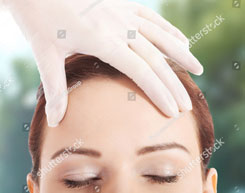
Forehead Lift
The forehead lift or brow lift is usually performed simultaneously with the facelift or it can be done alone. The procedure is aimed at raising the level of drooping eyebrows, which widens the eyes and gives a more pleasant and youthful appearance. The goal is an elegant natural looking eye-eyebrow relationship.
Drooping of the eyebrow, or hooding is frequently one of the first signs of aging and usually begins around age 40. Drooping eyebrows can give the appearance of being tired and angry. It also causes a redundancy of the upper eyelid. It helps open the eyes and remove the upper eyelid bagginess. It can also help improve the “crow’s feet” wrinkles on the corners of each eye.
Candidates
In general patients that desire a smoother more relaxed forehead are good candidates for a forehead lift. Also patients wishing to pursue a forehead lift with a more permanent effect than can be achieved with Botox.
Brow lift surgery is most commonly performed on people aged 30 years of age and older who are bothered by descending eyebrows. The procedure is sometimes performed on younger patients who inherited low eyebrows.
Procedure
Through the appropriate incision the skin is elevated and the deeper layers of the forehead are ‘lifted’. Muscles that depress the eyebrows are typically cut. The skin and deeper layers are then repositioned and attached to the underlying bone to stabilize their new position. The results are a reversal of the effects of gravity and tightening of soft tissues of the forehead to restore a more youthful contour to the upper face.
Complementary Procedures
Often eyelid surgery (blepharoplasty) is performed in conjunction with a brow lift to rejuvenate the brow / upper eyelid unit. If lower facial aging is also present, a facelift and/or neck lift may be considered. A skin resurfacing procedure may be performed to improve skin surface changes.
Recovery
Patients will experience a certain amount of swelling and bruising in the 10 day period following surgery. In some patients, this condition may include the cheek and eye area as well as the forehead. You will be advised to keep your head elevated in order to reduce swelling. Cold compresses may further reduce swelling. As the incisions heal, you may experience some numbness as well as itching, both of which will diminish with time. The sutures are usually removed within 7 days following surgery. Any prolonged bruising can be camouflaged with standard make-up techniques.
